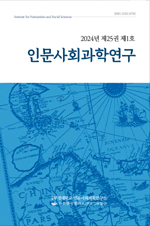- 영문명
- Trust Under Emotional Strain: Negative Affect and the Paradox of Increased Trust
- 발행기관
- 부경대학교 인문사회과학연구소
- 저자명
- 이종화(Chongwha Lee)
- 간행물 정보
- 『인문사회과학연구』제26권 제3호, 327~350쪽, 전체 24쪽
- 주제분류
- 사회과학 > 사회과학일반
- 파일형태
- 발행일자
- 2025.08.31

국문 초록
타인에 대한 신뢰는 위험이 따른다. 왜냐하면 신뢰를 보냈던 사람 본인과 그의 자원이 타인에게 착취당하는 취약성을 안고 있기 때문이다. 다른 사람을 믿을지 말지에 대한 결정은 그 사람에 대한 신뢰에 위험스런 베팅을 하는 것과 비슷하다. 따라서 타인의 행동에 대한 긍정적인 기대가 무산될 때, 배신 비용(betrayal cost)이라는 댓가를 치르게 된다. 부정적인 정서를 가진 사람이 오히려 타인에 대한 신뢰가 더 높을 수 있다. 이것은 다음과 같이 설명된다. 부정적인 정서를 가진 사람은 그들의 현재 감정상태를 바꾸려는 경향이 있으며, 그들은 좋은 상태로 기분을 전환시켜 줄 수 있는 위험스런 상황에 기꺼이 참여하게 된다. 부정적인 정서는 모든 일이 현재 잘 진행되지 않고 있으며, 목표를 향한 진보는 기대보다 모자라고 더디다는 느낌을 전달한다. 이 경우 사람들은 목표지점보다 멀리 있다고 느껴 자신을 부추겨 더 많은 노력을 기울이며, 즉각적인 주의를 요구하는 과업-타인에 대한 신뢰-에 더 몰두하게 된다. 본 연구는 유럽사회조사(European Social Survey, ESS, Wave 11, 2023) 자료를 이용, 이 가설 즉, 부정적인 정서를 가진 사람이 타인을 더 신뢰하는지 여부를 실증적으로 규명하기 위한 목적으로 수행되었다. 먼저 신뢰가 내생변수인지 확인하기 위해 축소된 회귀방정식(reduced form)에서 잔차(e-hat) 예측치를 구해 구조방정식의 설명변수로 투입하여 회귀하니 잔차가 0이 아님이 드러나 신뢰가 내생변수임이 판명되었다. 따라서 OLS추정이 아닌 IV추정기법을 사용해야만 했다. 이 내생성은 정서와 신뢰에 동시에 영향을 미치거나, 반대로 정서가 신뢰에 영향을 미치는 역인과관계(reverse causality), 관찰되지 않는 생략된 변수(omitted variable)에서 발생된다. 이를 해결하기 위해 신뢰의 도구변수로 교육수혜연한과 기후변화에 대한 염려를 도입하여 신뢰가 정서에 미치는 영향을 추정할 경우, 신뢰가 정서에 부정적인 영향을 미친다는 점을 실증적으로 규명하였다. 본 연구는 부정적인 정서를 가진 사람이 타인을 더 신뢰한다(Saadadoui et al., 2018)는 신뢰게임에서 밝혀낸 사실을 간접적으로 뒷받침했다는데 의의가 있다.
영문 초록
Trust in others entails risk because the person who offers trust, along with their resources, becomes vulnerable to exploitation by others. The decision of whether or not to trust someone is akin to making a risky bet on that person's trustworthiness. Therefore, when positive expectations about the other person's behavior are not met, one pays the price of what is called a betrayal cost. Interestingly, individuals with negative emotions may actually exhibit higher levels of trust in others. This can be explained as follows: People experiencing negative emotions tend to seek ways to alter their current emotional state and are more willing to engage in risky situations that might lead to a better emotional outcome. Negative emotions signal that things are not going well at present, and that progress toward one’s goals is slower or less than expected. In such cases, people feel further from their goals, which motivates them to exert more effort and focus more intensely on tasks requiring immediate attention—such as trusting others. This study was conducted using data from the European Social Survey (ESS, Wave 11, 2023) with the aim of empirically verifying the hypothesis that individuals with negative emotions are more likely to trust others. To first determine whether trust is an endogenous variable, predicted residuals (e-hat) were obtained from a reduced-form regression equation and then included as explanatory variables in a structural equation model. The residuals were found to be significantly different from zero, confirming that trust is indeed endogenous. Therefore, instead of using OLS estimation, an instrumental variable (IV) estimation technique was required. This endogeneity may arise from variables that simultaneously affect both emotion and trust, from reverse causality (i.e., emotions being affected by trust), or from unobserved omitted variables. To address this issue, years of education and concern about climate change were introduced as instrumental variables for trust. When estimating the effect of trust on emotion using these instruments, it was empirically shown that trust has a negative impact on emotion. This study has significance in that it indirectly supports the finding from trust games (Saadadoui et al., 2018) that individuals with negative emotions tend to trust others more.
목차
Ⅰ. 서론
Ⅱ. 선행연구
Ⅲ. 데이터와 추정방법
Ⅳ. 결론
참고문헌
키워드
해당간행물 수록 논문
참고문헌
최근 이용한 논문
교보eBook 첫 방문을 환영 합니다!

신규가입 혜택 지급이 완료 되었습니다.
바로 사용 가능한 교보e캐시 1,000원 (유효기간 7일)
지금 바로 교보eBook의 다양한 콘텐츠를 이용해 보세요!



